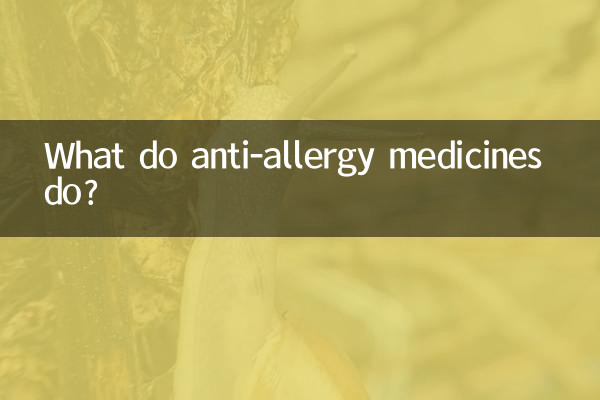What do anti-allergy medicines do?
Allergy is a phenomenon in which the human immune system overreacts to certain substances (such as pollen, dust mites, food, etc.), often manifesting as symptoms such as sneezing, skin itching, redness and swelling. Allergy medications are an important tool in relieving these symptoms. This article will introduce in detail the functions, classifications and common drugs of anti-allergic drugs, and combine them with hot topics in the past 10 days to provide readers with a comprehensive reference.
1. The main functions of anti-allergic drugs

Anti-allergy drugs work primarily through the following mechanisms:
| Mechanism of action | Description |
|---|---|
| Inhibits histamine release | Histamine is a key substance that triggers allergy symptoms, and antihistamines (such as loratadine) block its effect. |
| Stabilize mast cells | Cromoglycate sodium prevents mast cells from releasing histamine and other inflammatory mediators. |
| anti-inflammatory effect | Glucocorticoids (such as prednisone) can reduce the inflammatory response and relieve severe allergic symptoms. |
| constrict blood vessels | Epinephrine, for example, is used for acute allergic reactions (such as anaphylactic shock) to quickly relieve symptoms. |
2. Classification of anti-allergic drugs and common drugs
Anti-allergy drugs can be divided into the following categories based on their mechanism of action and use:
| Category | Representative medicine | Applicable symptoms |
|---|---|---|
| antihistamines | Loratadine, Cetirizine | Allergic rhinitis, urticaria |
| mast cell stabilizer | Cromoglycate sodium, ketotifen | Prevent asthma and allergic conjunctivitis |
| Glucocorticoids | Prednisone, dexamethasone | Severe allergic reactions, eczema |
| Adrenaline | epinephrine injection | anaphylactic shock |
3. Popular allergy-related topics in the past 10 days
Recently, allergy-related topics have become more popular on social media and news platforms. Here are some popular contents:
| topic | heat index | Main content |
|---|---|---|
| Pollen allergies are more common in spring | ★★★★★ | Increases in pollen levels have been reported in many places, and antihistamine sales have surged. |
| Clinical trials of new anti-allergy drugs | ★★★★ | A new drug targeting the IL-4 receptor has entered phase III clinical trials and is expected to reduce side effects. |
| Food allergy prevention | ★★★ | Experts suggest that early exposure to peanuts in infants and young children can reduce the risk of allergies. |
| Home care for allergic rhinitis | ★★★ | Doctors recommend saline nasal irrigation combined with medication. |
4. How to use anti-allergic drugs correctly
Please note the following points when using anti-allergy medications:
1.Take medication as directed by your doctor: Especially glucocorticoids and epinephrine should be used strictly according to the doctor's instructions.
2.Be aware of side effects: Antihistamines may cause drowsiness, so use with caution before driving.
3.avoid allergens: Medications can only relieve symptoms, reducing exposure to allergens is fundamental.
4.Regular review: Long-term use of hormone drugs requires monitoring of blood sugar, blood pressure and other indicators.
5. Summary
Anti-allergic drugs relieve symptoms through mechanisms such as inhibiting histamine, stabilizing mast cells, and anti-inflammation. There are many types of anti-allergic drugs, each with its own characteristics. Recently, topics such as pollen allergy and new drug development have attracted much attention. The correct use of medication must be combined with the doctor's advice and your own situation, while focusing on prevention. I hope this article can help readers better understand the role and use of anti-allergy medications.

check the details

check the details